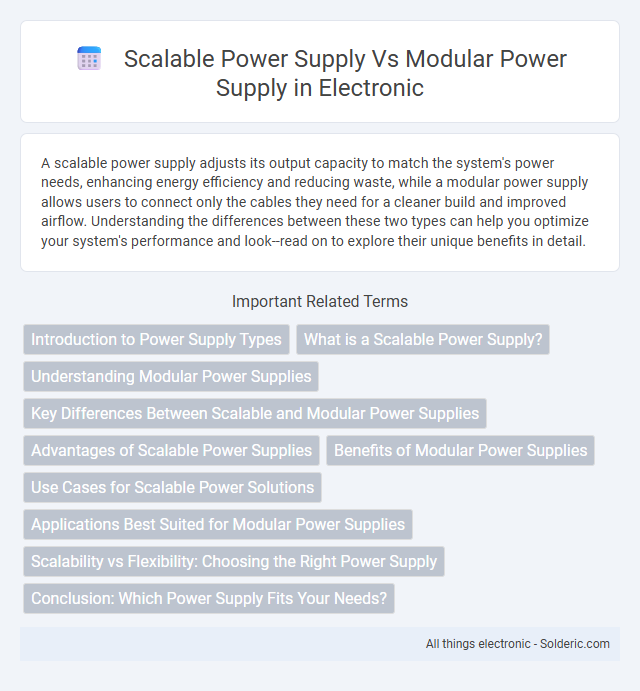A scalable power supply adjusts its output capacity to match the system's power needs, enhancing energy efficiency and reducing waste, while a modular power supply allows users to connect only the cables they need for a cleaner build and improved airflow. Understanding the differences between these two types can help you optimize your system's performance and look--read on to explore their unique benefits in detail.
Comparison Table
| Feature | Scalable Power Supply | Modular Power Supply |
|---|---|---|
| Definition | Power supply system that grows in capacity by adding modules. | Power supply with detachable cables for customization and efficient cable management. |
| Scalability | High; capacity increases by adding power modules. | Limited; fixed total power but customizable cable use. |
| Cable Management | Varies; depends on system design. | Excellent; supports only necessary cables, reducing clutter. |
| Use Case | Data centers, enterprise applications needing flexible power capacity. | Personal computers, gaming rigs needing neat cable setups. |
| Cost | Higher initial and upgrade costs due to modular units. | Moderate; premium pricing for detachable cables. |
| Maintenance | Easy to upgrade by adding modules without downtime. | Simple cable replacement and upgrade without power supply change. |
Introduction to Power Supply Types
Scalable power supplies enable flexible adjustments of voltage and current, catering to evolving energy demands in industrial and laboratory settings. Modular power supplies consist of interchangeable units that simplify maintenance and upgrades by allowing users to replace or add components without overhauling the entire system. Understanding the differences between these power supply types helps you select the most efficient and adaptable solution for your specific application.
What is a Scalable Power Supply?
A scalable power supply is designed to expand its output capacity by adding power modules, allowing customization of power output based on specific application needs. It offers flexibility in design, enabling companies to scale power efficiently as demand grows without replacing the entire system. Scalable power supplies are ideal for industries requiring adaptable and high-performance power solutions, such as telecommunications and data centers.
Understanding Modular Power Supplies
Modular power supplies offer users the flexibility to connect only the necessary cables, reducing clutter and improving airflow within the PC case. Unlike scalable power supplies, which can adjust output power based on demand, modular units focus on cable management and customization without dynamically changing wattage. This design enhances system build aesthetics and simplifies upgrades, making modular power supplies a popular choice among PC enthusiasts.
Key Differences Between Scalable and Modular Power Supplies
Scalable power supplies are designed to expand output capacity by integrating multiple units, allowing flexible power scaling for growing demands, while modular power supplies feature interchangeable components or modules for easy customization and maintenance. Scalable systems excel in large-scale applications requiring incremental power increases, whereas modular supplies prioritize adaptability with plug-and-play modules for diverse configurations. The key differences lie in scalability through system expansion versus modularity through component interchangeability, affecting installation complexity, upgrade paths, and cost efficiency.
Advantages of Scalable Power Supplies
Scalable power supplies offer enhanced flexibility by allowing users to expand power capacity incrementally, adapting to increasing load demands without replacing the entire system. These supplies improve system efficiency and reduce downtime through easy integration of additional modules or units, enabling seamless scalability in industrial or data center environments. Cost-effectiveness is another advantage, as businesses can invest gradually in power infrastructure aligned with growth, avoiding upfront overprovisioning expenses.
Benefits of Modular Power Supplies
Modular power supplies offer enhanced cable management by allowing users to connect only the cables they need, reducing clutter and improving airflow within the computer case. They provide greater flexibility for future upgrades or changes, as additional components can be supported without replacing the entire power supply unit. This customization leads to improved system aesthetics and easier maintenance compared to fixed, scalable power supply designs.
Use Cases for Scalable Power Solutions
Scalable power supplies are ideal for industrial automation and data centers where power demands fluctuate and incremental capacity expansion is essential. Modular power supplies suit applications requiring flexible configurations and quick replacements, such as telecommunications and test equipment setups. Both solutions optimize energy efficiency and reduce downtime by adapting to varying load requirements.
Applications Best Suited for Modular Power Supplies
Modular power supplies are best suited for applications requiring flexible and customizable configurations, such as high-performance gaming PCs, servers, and professional workstations where varying power needs demand easy cable management and upgradeability. Data centers and enterprise setups benefit from modular designs due to improved airflow and reduced clutter, enhancing cooling efficiency and maintenance. Their adaptability also makes them ideal for users prioritizing neat installations and efficient system scalability.
Scalability vs Flexibility: Choosing the Right Power Supply
Scalable power supplies allow for capacity expansion by linking multiple units, providing seamless power growth for evolving demands without replacing existing infrastructure. Modular power supplies offer flexibility through interchangeable components within a single unit, enabling customization and easy replacement of parts to meet diverse power requirements. Selecting between scalable and modular power supplies depends on whether future scalability or immediate adaptability to variable loads is the priority in your power management strategy.
Conclusion: Which Power Supply Fits Your Needs?
Scalable power supplies offer flexibility by allowing you to expand capacity as demand grows, making them ideal for dynamic, evolving power requirements. Modular power supplies provide ease of maintenance and customization by enabling specific components to be added or replaced without affecting the entire system. Choose scalable power supplies for future-proofing and growing operations, while modular power supplies suit environments requiring quick upgrades and streamlined repairs.
scalable power supply vs modular power supply Infographic

 solderic.com
solderic.com